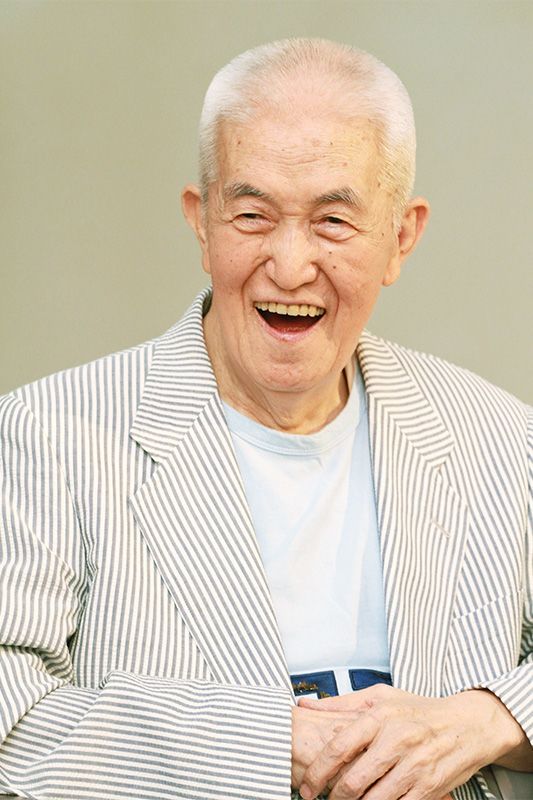Timeline for July 2016
Politics Economy Science Technology Society- English
- 日本語
- 简体字
- 繁體字
- Français
- Español
- العربية
- Русский
1
A group of five militants kills 20 hostages in an attack on a café in Dhaka, Bangladesh, before they themselves are killed. Seven Japanese members of the Japan International Cooperation Agency are among the fatalities.
4
Minamiya Marin, a 19-year-old Waseda University student, reaches the 6,190-meter summit of Denali (formerly known as Mount McKinley) in Alaska. By doing so, she becomes the youngest Japanese person to successfully climb all of the Seven Summits—the highest mountains in each of the seven continents.
 Minamiya Marin at the summit of Mount Everest on May 23, 2016. (Photo courtesy of Uniqlo)
Minamiya Marin at the summit of Mount Everest on May 23, 2016. (Photo courtesy of Uniqlo)
5
Japan and the United States agree to narrow the range of civilian workers at US bases who receive legal protection under the Status of Forces Agreement. This follows the indictment of an American civilian contractor in Okinawa for the murder of a local woman. The agreement is achieved in a new document, rather than through a revision to SOFA, as the Okinawa prefectural government had called for.
7
Japanese astronaut Ōnishi Takuya takes off on a Soyuz spacecraft from Baikonur Cosmodrome in Kazakhstan, arriving at the International Space Station on July 9. He will stay in the station until the end of October, conducting observations and experiments, including synthesis of high-quality proteins as part of development of new drugs.
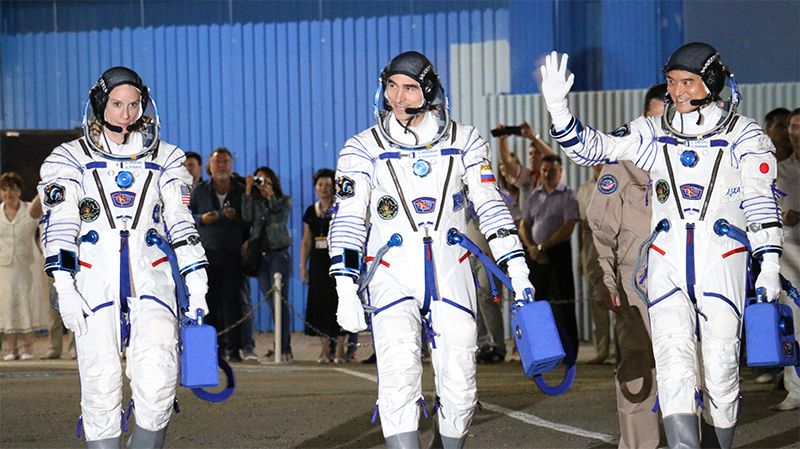 Ōnishi Takuya (right) with other astronauts before the launch from Baikonur Cosmodrome. (Photograph courtesy of Japan Aerospace Exploration Agency)
Ōnishi Takuya (right) with other astronauts before the launch from Baikonur Cosmodrome. (Photograph courtesy of Japan Aerospace Exploration Agency)
Ei Rokusuke, who wrote the lyrics to the international Sakamoto Kyū hit of 1961 “Ue o muite arukō” (known internationally as “Sukiyaki”), dies of pneumonia at the age of 83. He worked closely with composer Nakamura Hachidai to create a string of hit songs. His bestselling 1994 book Daiōjō (A Peaceful Death) sold more than 2 million copies.
10
The ruling coalition of the Liberal Democratic Party and Kōmeitō wins 70 of the 121 seats contested in the House of Councillors election. Forming a majority of more than two-thirds together with Initiatives from Osaka, Party for Japanese Kokoro, and favorably inclined independents, the bloc could potentially seek constitutional change.
13
NHK and other major Japanese media sources report that Emperor Akihito has expressed a wish to abdicate and relinquish his position to Crown Prince Naruhito. As there are no provisions concerning abdication in the Imperial Household Law, an amendment to the Imperial House Act or other special legislation would be necessary.
The Ministry of Internal Affairs and Communications announces that the population of Japan as of January 1, 2016, was 125.9 million, down 270,000 year on year. This was the seventh successive year of population decline, and the greatest drop since records began in 1968. The foreign population increased by 110,000 to 2.2 million.
15
Prime Minister Abe Shinzō meets Chinese Premier Li Keqiang on the sidelines of the Asia-Europe Meeting in Ulaanbaatar, Mongolia. Abe urges China to accept the July 12 South China Sea verdict from the Permanent Court of Arbitration, stating, “Japan has always advocated the importance of peacefully resolving disputes based on the ‘rule of law.’”
Messaging-app operator Line goes public on the Tokyo Stock Exchange, rising 31.7% on its first day of trading to finish at ¥4,345 for a market capitalization of ¥910 billion. It is launched on the New York stock exchange on July 14, where it rises 26.6% to end its first day of trading at $41.58 (around ¥4,400).
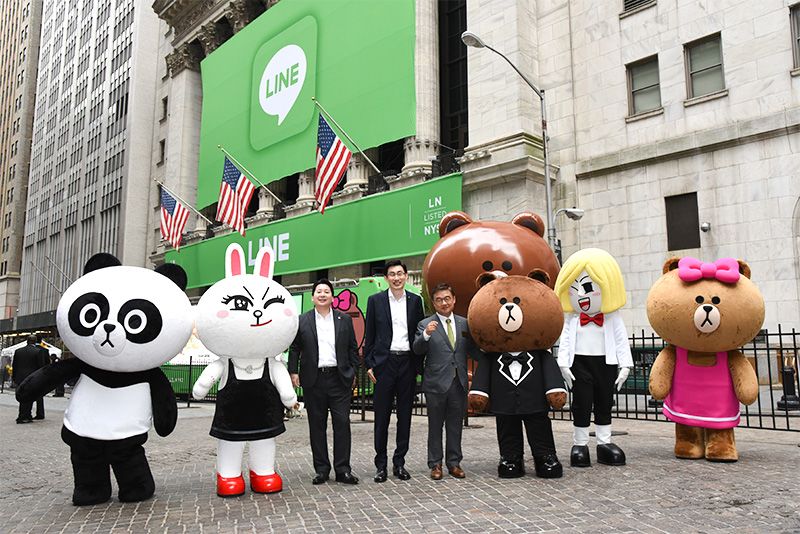 Line board members and characters in New York. (© Jiji)
Line board members and characters in New York. (© Jiji)
17
The World Heritage Committee of UNESCO announces the official registration of “The Architectural Work of Le Corbusier, an Outstanding Contribution to the Modern Movement” on its World Heritage list. One of the locations included is the National Museum of Western Art in Tokyo, which becomes Japan’s twentieth World Heritage site.
18
SoftBank Group announces its acquisition of British chip designer ARM Holdings for £24 billion. It is the largest ever overseas acquisition by a Japanese company. ARM’s cutting-edge semiconductor technologies are expected to boost SoftBank in the high-potential field of the “internet of things.”
19
Murata Sayaka wins the 155th Akutagawa Prize for her novella Konbini ningen (Convenience Store People), a story about a single, thirty-something woman who works in a convenience store, which was partly based on her own experiences. Ogiwara Hiroshi wins the Naoki Prize for Umi no mieru rihatsuten (The Barber’s With a View of the Sea).
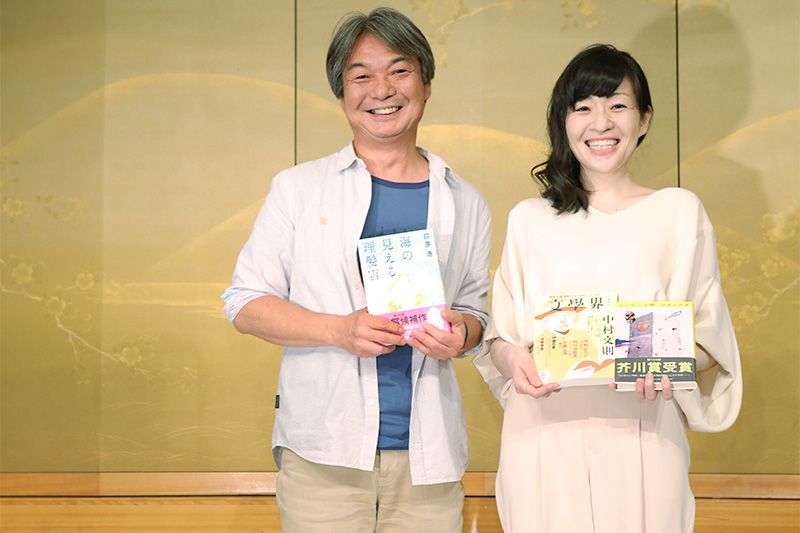 Naoki Prize winner Ogiwara Hiroshi (left) and Akutagawa Prize winner Murata Sakaya (right). (© Jiji)
Naoki Prize winner Ogiwara Hiroshi (left) and Akutagawa Prize winner Murata Sakaya (right). (© Jiji)
20
The Japan National Tourism Organization announces that a record 11.7 million foreign visitors came to Japan from January to June 2016. In figures released by the Ministry of Land, Infrastructure, Transport, and Tourism, however, spending per tourist from April to June dropped 9.9% year on year to ¥159,930, in part due to the appreciation of the yen.
The J. League announces it has signed a 10-year right agreement with British content distributer Perform beginning in 2017. The deal, worth ¥210 billion, will allow Perform to broadcast all J1, J2, and J3 games to mobile devices in Japan.
22
Pokémon Go, an augmented reality game developed by Niantic based on Nintendo characters, is launched in Japan. The game became an international phenomenon when it was rolled out in other markets earlier in July. Observers are monitoring what could be a significant economic impact, while also expressing concerns about game-related incidents.
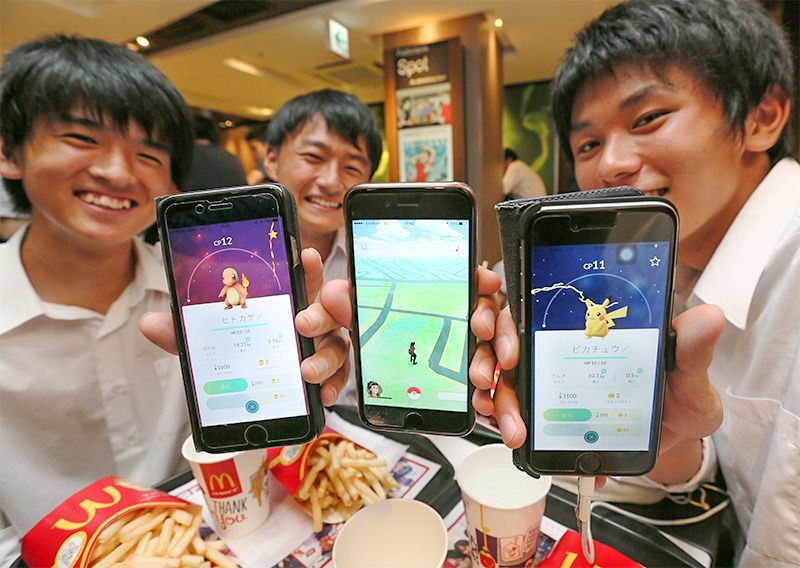 High school students playing Pokémon Go at McDonald’s in Shibuya, Tokyo. (© Jiji)
High school students playing Pokémon Go at McDonald’s in Shibuya, Tokyo. (© Jiji)
26
A total of 19 people are killed and 26 injured in a mass stabbing at the disabled care facility Tsukui Yamayuri-en in Sagamihara, Kanagawa Prefecture. Police arrested a 26-year-old former employee of the facility following the incident, which is the deadliest mass attack in Japan in the postwar era.
Renowned pianist Nakamura Hiroko dies of colorectal cancer at the age of 72. In 1965, she finished fourth in the International Chopin Piano Competition, becoming the first Japanese prizewinner in the contest. She also acted as a judge at the International Tchaikovsky Competition and other events.
29
The Bank of Japan announces further expansion of monetary easing at its policy meeting. It will almost double purchase of exchange-traded funds from the current ¥3.3 trillion per year to an annual ¥6 trillion.
31
Koike Yuriko is elected as Tokyo’s first-ever woman governor. The former defense and environment minister defeated Masuda Hiroya, the officially sanctioned candidate from the Liberal Democratic Party to which Koike also belongs, and the opposition-backed journalist Torigoe Shuntarō. After working as an Arabic interpreter and TV newscaster, Koike spent 24 years as a National Diet member before stepping down to run for Tokyo’s highest office.
The legendary sumō champion Chiyonofuji dies at age 61 of pancreatic cancer. Born Akimoto Mitsugu, the wrestler rose to the top yokozuna rank and won 31 tournaments during his career, placing him third on the all-time list of basho winners. His sculpted musculature set him apart from his heavyset opponents and earned him the nickname “the wolf,” and he was the first rikishi in the sport to win 1,000 tournament matches.
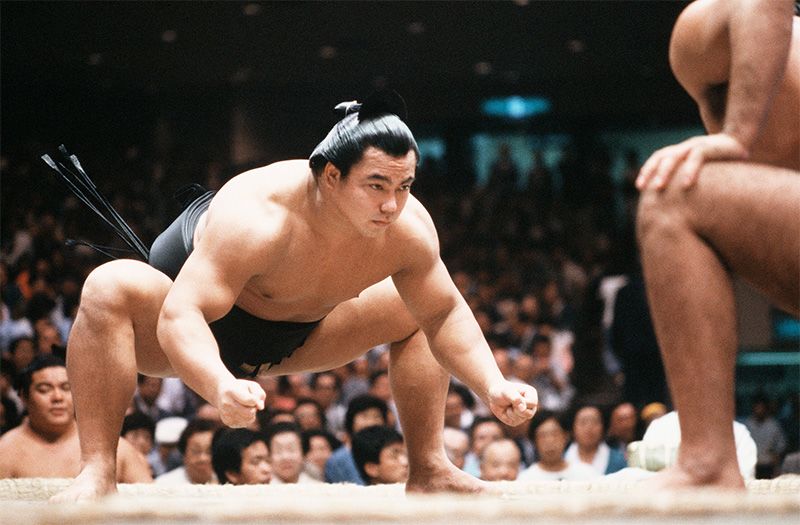 Chiyonofuji squares off against an opponent in the September 1985 tournament. (© Jiji)
Chiyonofuji squares off against an opponent in the September 1985 tournament. (© Jiji)
World Heritage tourism video games literature election space IT South China Sea population House of Councillors sumō imperial family Emperor Akihito
